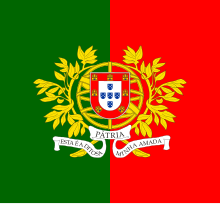
Back القوات المسلحة البرتغالية Arabic Въоръжени сили на Португалия Bulgarian Forces Armades Portugueses Catalan Portugiesische Streitkräfte German Fuerzas Armadas de Portugal Spanish نیروهای مسلح پرتغال Persian Portugalin asevoimat Finnish Forces armées portugaises French Forzas Armadas de Portugal Galician הכוחות המזוינים של פורטוגל HE
This article includes a list of general references, but it lacks sufficient corresponding inline citations. (August 2020) |
| Portuguese Armed Forces | |
|---|---|
| Forças Armadas | |
 | |
| Founded | 1318; 704 years ago |
| Current form | 1950 |
| Service branches | |
| Headquarters | Lisbon, Portugal |
| Leadership | |
| President | Marcelo Rebelo de Sousa |
| Prime Minister | Luís Montenegro |
| Minister of National Defence | Nuno Melo |
| Chief of the General Staff | General José Nunes da Fonseca |
| Personnel | |
| Available for military service | 2,566,264 males, age 18–35 (2010[3]), 2,458,297 females, age 18–35 (2010[3]) |
| Fit for military service | 2,103,080 males, age 18–35 (2010[3]), 2,018,004 females, age 18–35 (2010[3]) |
| Reaching military age annually | 62,208 males (2010[3]), 54,786 females (2010[3]) |
| Active personnel | 27,741 (2021)[1] |
| Deployed personnel | 927 (2022)[2] |
| Expenditure | |
| Budget | |
| Percent of GDP | |
| Industry | |
| Domestic suppliers | Arsenal do Alfeite Edisoft EID, S.A. OGMA Tekever UAVision West Sea Shipyard |
| Foreign suppliers | |
| Annual exports | |
| Related articles | |
| History | Military history of Portugal |
| Ranks | Military ranks of Portugal |
The Portuguese Armed Forces (Portuguese: Forças Armadas) are the military of Portugal. They include the General Staff of the Armed Forces, the other unified bodies and the three service branches: Portuguese Navy, Portuguese Army and Portuguese Air Force.[5]
The President of the Republic is the head of the Portuguese military, with the title of "Supreme Commander of the Armed Forces" (Comandante Supremo das Forças Armadas).[6] The management of the Armed Forces and the execution of the national defense policy is however done by the government (chaired by the Prime Minister) via its Minister of National Defense.[7] The highest-ranking officer in the military is the Chief of the General Staff of the Armed Forces, which has operational control of the Armed Forces during peacetime and assumes their full control when a state of war exists.
The Armed Forces are charged with protecting Portugal as well as supporting international peacekeeping efforts when mandated by North Atlantic Treaty Organization, the United Nations or the European Union.
Portugal was ranked the 3rd most peaceful country in the World in the Global Peace Index 2017, presently not having significant national security issues. The Portuguese Armed Forces have been thus focused in non-military public service activities and in external military operations. Recent external operations include anti-piracy action in the Gulf of Aden, the conflicts in the Central African Republic and in Afghanistan, the peacekeeping missions in East-Timor, Lebanon, Kosovo and Bosnia-Herzegovina, and the air policing of Iceland and the Baltic States.[8]
Military units and other bodies are stationed all throughout Portuguese territory, including Continental Portugal, Madeira and the Azores.
The Portuguese Armed Forces were opened to women during the early-1990s. Portugal had mandatory conscription for all able-bodied men until November 2004.[9]
- ^ "Forças Armadas Portuguesas contabilizaram em 2021 um total de 27 741 efetivos".
- ^ "MISSÕES EM NÚMEROS".
- ^ "The World Factbook". Cia.gov. Central Intelligence Agency. Retrieved 25 January 2015.
- ^ "Military Spending by Country".
- ^ "Lei Orgânica 1-A/2009 Capítulo I Artigo 7º Nº1" (PDF). Diário da República. XVII Governo Constitucional de Portugal. Retrieved 23 January 2014.
- ^ "Lei 31-A/2006 Capítulo III Artigo 9º" (PDF). Diário da República. XVII Governo Constitucional de Portugal. Archived from the original (PDF) on 18 April 2016. Retrieved 23 January 2014..
- ^ "Lei 31-A/2006 Capítulo IV Artigo 20º" (PDF). Diário da República. XVII Governo Constitucional de Portugal. Archived from the original (PDF) on 18 April 2016. Retrieved 23 January 2014.
- ^ "Hístorico de operações". emgfa.pt. Estado-Maior-General das Forças Armadas. Retrieved 23 January 2014.
- ^ "Portugal" (PDF). NATO. 2008. Retrieved 25 May 2018.